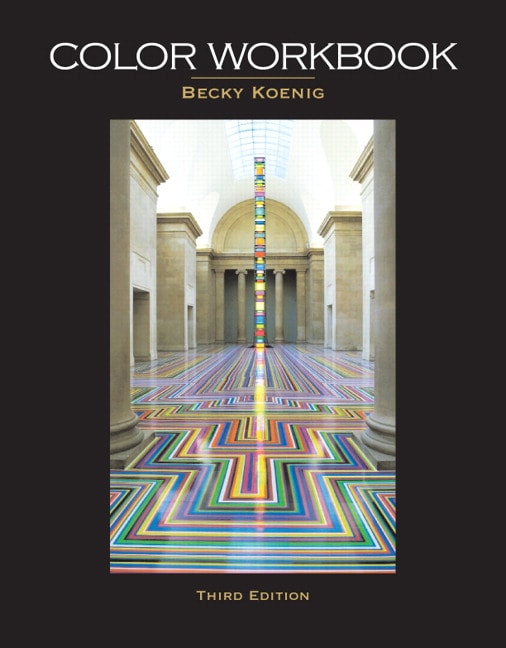
30.00$ - Purchase this E-book
Category : Higher Education
Contents The Delaunays 222 Pierre Bonnard–Premier Colorist 222 Table of Contents
Preface ix
Acknowledgments xi
Notes on Materials xiii
PART ONE COLOR STUDY 1
Chapter 1 The Nature of Color: Color Physics and Perception 1
Introduction 1
Color Physics 2
Electromagnetic Spectrum 3
Primary Colors of Light 4
Additive Color System 4
Color Perception 6
Additive Color Media 8
Subtractive Color System 9
Subtractive Primary Colors 10
The Relationship of Additive and Subtractive Color 12
Complementary Colors 13
Local and Relative Color 15
Activities 15
Chapter 2 The Color Circle and Color Systems: An Exploration 17
Introduction 17
Color Circles and Systems–A Brief History 17
Color Circles–A Rationale 23
The Traditional Subtractive Color Circle 24
Hues–Components of a Color Circle 26
Achromatics and the Color Circle 26
Hue Contrast 27
Hue Relationships on the Color Circle 28
Hue Values 28
Color Temperature 28
Color Harmony 30
Color Families 30
Color Opposites 31
Color Chords 32
Color Proportion 32
Activities 33
Chapter 3 Attributes of Color 36
Introduction 36
Hue 36
Hue Names 36
Hue Standards 37
Hue Identification–Base Hues 37
Hue Variation 39
Value 39
Value Scales: Tints and Shades 40
Inherent Value of Hues 40
Value Keys 42
Saturation 43
Saturation and Value 43
Systems of Color Saturation–Color Solids 43
Methods to Vary Color Saturation 46
Saturation Keys 49
Activities 49
Chapter 4 Color Interaction 54
Introduction 54
Color Relativity–Chevereul and Albers 54
Simultaneous Contrast 54
Afterimage 56
Albers and Color Interaction 58
Color Relativity–Principles of Color Interaction 59
Optical Mixtures 65
Color Mixing Discs 66
Broken Color 67
Optical Mixtures of Pigmented Color 67
Other Types of Color Interaction 69
The Bezold Effect 69
Color Dominance 71
Color Transparency 71
Actual Transparency 71
Simulated Transparency 72
Activities 73
Chapter 5 The Materials of Color 78
Introduction 78
Physical Color Materials 78
Pigmented Materials 78
Types of Pigment 79
Vehicles and Binders 80
Opaque and Transparent Media 82
Colorfastness of Artist’s Materials 82
Student- and Professional-Grade Colors 83
Painting Media 84
Inks and Dyes 89
Process Materials 90
Color Photography 90
Digital Photography 92
Color Printing 92
Color Reproduction 94
Activity 98
Chapter 6 Computer Color 99
Introduction 99
Computer Color Basics 99
The Color Monitor 100
Bit Depth 100
Bitmap and Vector-Based Programs 101
Bitmap 101
Vector 101
Types of Digital Software 102
Types of Image Files 103
Computer Tools 103
Toolbox 103
Filters 103
Layers 108
Computer Color 108
Swatch Palette 113
Using Computer Color 113
Color Theory and Computer Design 113
To Pick and Apply Color 114
Computer Color Printing 116
Color Management 116
Activities 117
PART TWO DESIGNING WITH COLOR 121
Chapter 7 The Elements of Design 121
Introduction 121
The Abstract Concepts of Design 121
The Picture Plane 122
Design Elements 122
Line 122
Shape 123
Space and Form 127
Ways to Create Space 128
Linear Perspective 129
Value 131
Texture 132
Activities 133
Chapter 8 The Principles of Design 137
Introduction 137
Order and Chaos 137
Gestalt Theory in Design 138
Design Principle–Unity 139
Ways to Create Unity 140
Economy 142
Design Principle–Emphasis 142
Ways to Create Emphasis 143
Design Principle–Balance 145
Symmetry 146
Asymmetrical Balance 147
Crystallographic and Radial Balance 148
Design Principles–Proportion and Scale 149
Design Principles–Movement and Rhythm 149
Movement 149
Rhythm 150
Activities 151
Chapter 9 Color Schemes and Harmonies 156
Introduction 156
Simple Color Harmonies 156
Achromatic Harmony 157
Monochromatic Harmony 157
Analogous Harmony 158
Contrasting or Opposing Harmonies 158
Complementary or Dyad Harmony 159
Cool/Warm Color Harmony 160
Double Complement Harmony 161
Split Complementary Harmony 161
Balanced Color Harmonies 163
Triadic Harmony 163
Tetrad Harmony 165
Keyed Color Harmonies 166
Informal Color Harmonies 166
Activities 169
Chapter 10 Designing with Color 173
Introduction 173
Color Unity 173
Color Repetition 173
Consistent Color Key or Temperature 174
Color Continuity 175
Color Similarity, Proportion, and Distribution 175
Color Emphasis 175
Color Contrast 175
Unique Color 179
Color Gradation 179
Color Balance 179
Relative Weight of Colors 179
Asymmetrical Color Balance 180
Color and Symmetry 181
Radial Color Balance 181
Color to Depict Form, Light, and Space 182
Color Value and Spatial Illusion 182
Form and Color 182
Color and Light 182
Color and Space 185
Light and Color Atmosphere in Abstraction 187
Color Rhythm and Movement 187
Activities 189
Chapter 11 Expressive Color 192
Introduction 192
Color Psychology 192
Color Symbols 195
Environmental Color 196
Color Harmony Versus Color Discord 197
Color Preference 198
Color Expression 199
Free-Form Color Harmony 200
Thematic Color 202
Activities 208
Chapter 12 Color in Art 211
Introduction 211
Reflected Light–Mosaics 211
Primacy of Form–The Renaissance 212
Renaissance Frescos–Massacio 212
Light and Movement–The Baroque 214
Caravaggio 214
Poetry in Color–Romantic Period 215
Joseph Mallord Turner 215
Time and Place–Impressionism 216
Claude Monet 216
Simple Elegance–Japanese Art 217
Woodblock Prints 217
Color Expression–Neoimpressionism 218
Van Gogh and Gauguin 218
Fauvism and Beyond 219
Henri Matisse 219
Movement in Space–Futurism 220
Balla 220
Color Utopians–Modernism and Purism 221
Le Corbusier 221
Inner Light–Abstract Expressionism 223
Helen Frankenthaler 223
Commercial Color and Culture 224
Andy Warhol 224
Light Reflected–Minimalism and Beyond 225
Color and Concept
Yves Klein 225
Dan Flavin 226
Pigment and Ritual–Anish Kapoor 227
Color in Installation and Image 226
Jennifer Steinkamp 226
Color in Light and Space 229
David Batchelor and Jim Lambie 229
Glossary 230
Bibliography 236
Index 239
Get Color Workbook, 3rd Edition by Becky Koenig, M.F.A.


0 commentaires:
Enregistrer un commentaire